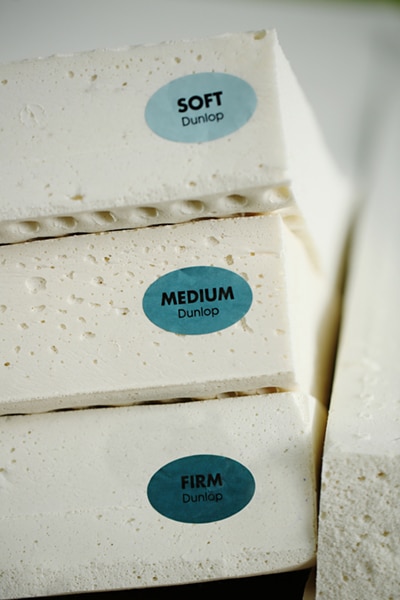If you’re in the market for a new mattress and have started the research process, you’ve probably noticed the vast array of options, from memory foam to natural latex. Mattresses are definitely not created equal, both in terms of comfort and the materials used.
Every mattress company has different goals and their own unique vision when it comes to what type of a product they want to introduce into the market. Some companies only focus on price, or they think about comfort but completely ignore the organic perspective.
So, what should you look out for? One of the biggest things is what types of certifications the mattress brand has to offer. Do they use any GOTS-certified organic materials? And if they are using Dunlop latex, is it certified by the Global Organic Latex Standard (GOLS)? The more verifiable information on a company’s website, the better.
This blog post will specifically focus on Dunlop latex, a natural latex that is incredibly popular in the mattress industry (and with good reason!) When shopping for a Dunlop mattress, it’s important that you look out for that GOLS certification though. Here’s why.
What is the Global Organic Latex Standard?
GOLS is the first global standard for organic latex. The Control Union recognized the demand and overall importance of being able to certify latex to a rigorous organic standard, bringing peace of mind to consumers.
One of the qualifications for this certification is that the product contains at least 95% certified organic raw material.

GOLS not only cares about the purity of the material but how the material is sourced. Is it grown on organic farms that are free of pesticides? Are workers treated fairly and paid an appropriate wage? Does the latex supplier follow proper wastewater treatment? The social and environmental impact of the product must be evaluated in order to meet the requirement of GOLS.
In order to earn the GOLS certificate, there are several factors that must be taken into consideration, most of which require proper documentation.
For example, there needs to be a clear traceability system in place so that the organic good can be traced back to where it was grown. The latex also needs to be labeled properly and must be kept separate from non-organic materials.
Think of it as a passport stamped with all the countries you’ve visited. The Dunlop latex also needs to have those “stamps” so that certifying bodies can see how the product was grown, where it was sourced, and how it was handled once it left the organic farm.
Non-Certified Dunlop Latex
So you’ve found a Dunlop latex mattress but you’re not seeing any signs of the GOLS certification. Or any certification, for that matter. Not only is this a total bummer, but it’s a total red flag.
Without proper certification, it’s impossible to prove if the Dunlop latex is, in fact, organic and composed of at least 95% raw material. There are instances of Dunlop being on the market that is only “natural,” but not organic.
There is also a chance that the latex is not simply latex, but a combination of latex and synthetic material, such as polyurethane.
But Their Website Says “100% Natural Latex”
This is misleading. In fact, we don’t even use this phrasing with our customers and our Dunlop latex is certified organic. Promoting any latex found in mattresses with a “100%” absolute is simply inaccurate.
In order for latex to bake into cozy layers, curing agents must be added to the rubber sap. This means that the final product is never truly 100% latex. Our Dunlop latex is approximately 95% natural latex, and our Talalay latex is approximately 97%. These are some of the highest percentages you will see in the mattress industry.
It’s impossible to turn raw sap into foam without these additives, so whenever you see that “100%” language, know that there is a bit more to it. These additives are not harmful to your health, but they’re there and should be accounted for when looking at percentages.
Final Thoughts
Dunlop latex is sure to be your new best friend, but we hope you opt for a mattress made with organic Dunlop rather than mystery Dunlop. We love surprises, but not when it comes to what’s in our mattresses. Hopefully, you feel the same way.
